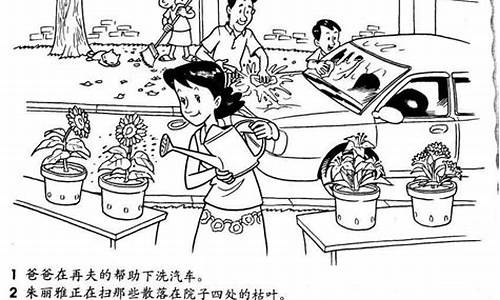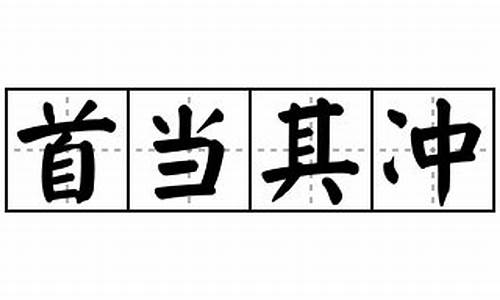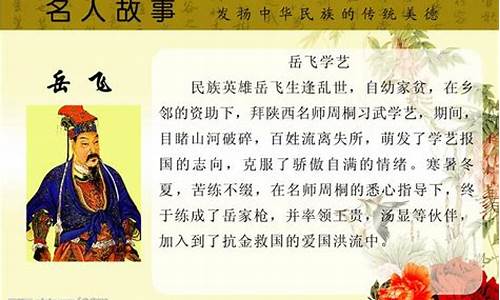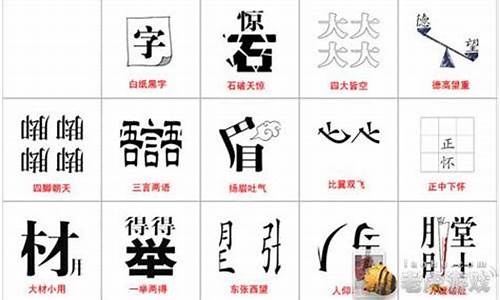成语翻译英文_成语翻译英文方法
大家好,今天我想和大家讲解一下“成语翻译英文”的工作原理。为了让大家更好地理解这个问题,我将相关资料进行了分类,现在就让我们一起来学习吧。
1.经典英语成语故事及翻译(五篇)
2.英文的成语大全
3.经典成语的英语翻译
4.将一下成语翻译成英文
5.请问如何翻译中文的成语成英文?
6.与马有关的成语英语

经典英语成语故事及翻译(五篇)
#能力训练# 导语成语在古代汉语与现代汉语的传承上占有重要的地位,它是汉语词汇系统中重要而又极富特色的组成部分。下面是 无 分享的经典英语成语故事及翻译经典英语成语故事及翻译(五篇)。欢迎阅读参考!
1.经典英语成语故事及翻译
卧薪尝胆
During the Spring and Autumn period (770-476BC), the State of Wu launched an attack against the State of Yue. The King of Wu was seriously wounded and soon died. His son Fu Chai became the new King. Fu was determined to get revenge. He drilled his army rigidly until it was a perfect fighting force. Three years later, he led his army against the State of Yue and caught its king Gou Jian. Fu took him to the State of Wu.
春秋时期,吴国和越国之间进行了一场战争,吴王不幸受了重伤,不久就死了。他的儿子夫差作了吴国的新国王,他发誓要替父亲报仇。于是,他严格的操练他的士兵,把他们训练成了一支非常厉害的军队。三年以后,他对越国发动了战争,抓住了越王勾践,把他带回了吴国。
In order to avenge his father's death, Fu let him live in a shabby stone house by his father's tomb and ordered him to raise horses for him. Gou pretended to be loyal to Fu but he never forgot his humiliation. Many years later, he was set free. Gou secretly accumulated a military force after he went back to his own state. In order to make himself tougher he slept on firewood and ate a gall-bladder before having dinner and going to bed every night. At the same time he administered his state carefully, developing agriculture and educating the people. After a few years, his country became strong. Then Gou seized a favorable opportunity to wipe out the State of Wu.
为了复仇,夫差让勾践住在他父亲墓旁的破石屋里天天看墓、喂马。勾践表面上服从,心里面却想着复仇。几年以后,勾践被放回越国。他立刻开始秘密聚集一支军队。为了提醒自己不要忘了报仇,他睡在柴上,还每天在吃饭睡觉前尝一尝苦胆。同时,他专心治理国家,大力发展农业,加强民众教育。几年后,越国又变得强大起来,然后,勾践抓住一个适当的机会消灭了吴国。
Later, people use it to describe one who endures self-imposed hardships to strengthen one's resolve to realize one's ambition.
后来,人们用它来形容人刻苦自励以达到自己定下的目标。
2.经典英语成语故事及翻译
望梅止渴
Quenching Thirst by Watching Plums
One summer, Cao Cao was leading his troops in a punitive expedition against Zhang Xiu. It was extraordinarily hot. The burning sun was like a fire, and the sky was cloudless. The soldiers were walking on the winding mountain paths. The dense forest and the hot rocks exposed to the sun on both sides of the paths made the soldiers feel suffocated. By noontime the soldiers' clothes were wet through with sweat, and the marching speed slowed down. Some solders of weak physique even fainted on the roadside.
Seeing that the marching speed was slower and slower, Cao Cao was very worried because he feared that he might bungle the chance of winning the battle. But how could they quicken their speed? Cao Cao at once callde the guide and asked him on the quiet whether there was a source of water nearby. The guide shook his head, saying that the spring water was on the other side of the mountain, which was very far to have to make a detour to reach. Cao Cao realized that time didn't permit them to make such a detour. After thinking for a moment, he said to the guide, "Keep quiet. I'll find a way out." He knew that it would be to no avail to order his troops to quicken the steps. He had a brain wave and found a good solution. He spurred his horse and came to the head of the column. Pointing his horsewhip to the front, Cao Cao said, "Soldiers, I know there is a big forest of plums ahead. The plums there are both big and delicious. let's hurry along, and we will reach the forest of plums after bypassing this hill." When the solders heard this, they immediately slobbered. Picturing in their minds the sweet and sour flavour of the plums, the soldiers felt as if they were actually eating the plums, the soldiers felt as if they were actually eating the plums themselves. The morale greatly boosted, the soldiers quickened their steps a great deal automatically.
This story comes from "The Fake Tangery" in Anecdotes of This World by Liu Yiqing of the Southern Dynasties period (420-589). From this story, people have derived the set phrase "quenching thirst by watching plums" to refer to trying to comfort oneself of others by idle dreams.
有一年夏天,曹操率领部队去讨伐张绣,天气热得出奇,骄阳似火,天上一丝云彩也没有,部队在弯弯曲曲的山道上行走,两边密密的树木和被阳光晒得滚烫的山石,让人透不过气来。到了中午时分,士兵的衣服都湿透了,行军的速度也慢下来,有几个体弱的士兵竟晕倒在路边。
曹操看行军的速度越来越慢,担心贻误战机,心里很是着急。可是,眼下几万人马连水都喝不上,又怎么能加快速度呢?他立刻叫来向导,悄悄问他:“这附近可有水源?”向导摇摇头说:“泉水在山谷的那一边,要绕道过去还有很远的路程。”曹操想了一下说,“不行,时间来不及。”他看了看前边的树林,沉思了一会儿,对向导说:“你什么也别说,我来想办法。”他知道此刻即使下命令要求部队加快速度也无济于事。脑筋一转,办法来了,他一夹马肚子,快速赶到队伍前面,用马鞭指着前方说:“士兵们,我知道前面有一大片梅林,那里的梅子又大又好吃,我们快点赶路,绕过这个山丘就到梅林了!”士兵们一听,仿佛已经吃到嘴里,精神大振,步伐不由得加快了许多。
故事出自《世说新语?假谲》。成语“望梅止渴”,比喻用空想安慰自己或他人。
3.经典英语成语故事及翻译
一鸣惊人
In the Warring States Period, Duke Wei of Qi neglected state affairs, for the first three years of his reign, giving himself over to dissipation. One of his ministers, Chun Yukun who had a good sense of humour, said to him: 'There is a big bird which has neither taken wing nor sung for three years.' The duke answered, 'Once that bird starts to fly and sing, it will astonish the world.' The duke thereupon devoted himself to his duties and built his state up into a powerful one.
战国时代,齐威王即位后做了三年国君,只顾享乐,不理政事。有个善于说笑话的人叫淳于髡,一天对齐威王说:“城里有一只大鸟,三年不飞也不叫,你知道这是什么道理?”齐威王说:“这鸟不飞则罢,一飞就冲天;不鸣则罢,一鸣就惊人。”在淳于髡的激发下,齐威王开始治理国家,取得很大成绩,齐国的声威一直保持了几十年。
4.经典英语成语故事及翻译
精卫填海
Once upon a time, the youngest daughter of Emperor Yan, legendary ruler of primitive China, went boating on the Eastern Sea. While she was enjoying herself, a strong wind rose on the sea and her boat capsized. Just before she was buried by the surging waves, her spirit turned into a beautiful bird. As it flew over the roaring sea, it cried sadly in the sound "jinwei, jingwei". That was why people called it "Jingwei".
The bird lived on a mountain near the sea. It hated the sea so much that it decided to fill it up. Every day, it flew to and fro between the mountain and the sea, carrying in a twig or a pebble from the mountain and dropping it into the sea.
One day, the roaring sea said to Jingwei, "Poor little bird, stop doing that meaningless thing! You'll never fill me up." Jingwei replied, "I'll fill you up no doubt! I will, even if it'll take me thousands of years! I'll fight on until doomsday!"
The brave little bird kept carrying twigs and pebbles from the mountain to the Eastern Sea without taking a rest.
From this fable comes the idiom "The bird Jingwei trying to fill the sea". We use it to describe people who are firm and indomitable and will not stop until they reach their goal.
从前,炎帝(传说中中国原始社会的统治者)的小女儿在东海上划船。正当她划得高兴时,海面上突然升起一阵大风,把她的小船弄翻了。就在她要被汹涌的波浪吞 没时,她的灵魂变成了一只美丽的小鸟。它飞过那咆哮的海面,伤心的叫着"精卫,精卫"的声音。所以人们就叫她"精卫"。
精卫鸟住在靠海的一座山上。它非常恨大海,所以决心要把它填平。它每天来回于山海之间,把从山上衔来的小树枝和小石子扔在大海里。
一天,咆哮的大海对精卫说:"可怜的小鸟,停止你那无谓的举动吧!你是永远都填不平我的。" 精卫回答说:"我当然会把你填平的!即使这需要千千万万年的时间,我也一定会斗争到底,直到你的末日来临!"
这只勇敢的小鸟继续从山上衔来小树枝和小石子,扔到东海中,从未有片刻休息。
"精卫填海"这个成语就是由这个传说而来的,形容那些坚定不移,不屈不挠,不到目的决不罢休的人。
5.经典英语成语故事及翻译
fail the exam
名落孙山
In the Song Dynasty (宋朝) there was a joker called Sun Shan(孙山).
宋朝有一个很幽默的人,他叫孙山。
One year he went to take the imperialexamination, and came bottomof the listof successfulcandidates.
有一年他去参加考试,公布名单时他是最后一名。
Back in his hometown, one of his neighbor asked him whetherthe neighbor's son had also passed.
回到家,他的邻居向他打听自己的儿子考得怎么样。
Sun Shan said, with a smile:"Sun Shan was the last on the list. Your son came after Sun Shan."
孙山笑着对邻居说:“孙山考了最后一名,你儿子的名字还在孙山的后面呢。”
The peopleused this idiom to indicatefailing in an examination or competition.
人们用“名落孙山”来比喻考试没有考上或者选拔没有被录取。
英文的成语大全
杯弓蛇影 be jittery with imaginary fears
烈火见真金 Fine gold must be purified in the flaming fire
狐假虎威 sought power by riding the back of the tiger
异曲同工 so differently but can achieve the same effect
集腋成裘 Little and often fills the purse
有眼不识泰山 Entertain an angel unawares.
经典成语的英语翻译
1、Love
me,
love
my
dog.
翻译爱屋及乌
2、Seeing
is
believing.翻译眼见为实
3、 A
slow
sparrow
should
make
an
early
start.
翻译笨鸟先飞
4、
white
night
5、spare
no
effort;
go
all
out;
do
one's
best
翻译全力以赴
6、
No
discord,
no
concord.
翻译不打不相识
例句1、The
dam
has
now
exerted
remarkable
economic
and
social
benefits.
这座大坝目前已发挥了引人注目的经济效益和社会效益;
2、Secondly,
the
cultural
market
will
also
help
to
prevent
the
elegant
literature
and
art
from
life,
from
the
audience
and
into
the
closed
circle
of
self
speaking.其次,文化市场还有助于牵制高雅文艺脱离生活,脱离受众,走入自言自语的封闭的圈子.
将一下成语翻译成英文
A friend in need is a friend indeed.患难见真情。
Actions speak louder than words.事实胜于雄辩
All is not gold that glitters.闪光的不一定都是金子
An idle youth, a needy age.少壮不努力,老大徒伤悲
Bitter pills may have wholesome effects.良药苦口
Do wrong once and you"ll never hear the end of it.一失足成千古恨
Every cloud has a silver lining.守得云开见月明
Every man has his fault.人孰无过
First come, first served.捷足先登
Haste makes waste.欲速则不达
Honesty is the best policy.诚实至上
In fair weather prepare for foul.未雨绸缪
Knowledge is power.知识就是力量
Let bygones be bygone.既往不究
Look before you leap.三思而后行
Man proposes, God disposes.谋事在人,成事在天
Money talks.金钱万能
No gains without pains.吃得苦中苦方为人上人
请问如何翻译中文的成语成英文?
the name fits. 人如其名
deserve one's reputation 名不虚传
more in name than in reality名不副实
on the scroll of fame 名垂青史
名列前茅toprank
名落孙山 be nowhere
fair and square 名正言顺
as the name implies 顾名思义
与马有关的成语英语
这是一个很大的课题,不少学者专门出书或发表若干论文去阐述这一论题。不过,简单来说,常见的方法有以下几种:
1、直译:前提是不是中文文化背景下特有的、直译过去不会引起歧义或造成不解的,如“一石二鸟”可译成“to kill two birds with one stone”;“易如反掌”可译成“as easy as turning over one's hand”,“火中取栗”可译成“to pull the chestnut out of the fire”,这样子翻译既通俗易读,又十分形象。
2、以英语里的相近或相等的成语替换:如“爱屋及乌”可译成“Love me,love my dog”;“趁热打铁”可译成“to strike while the iron is hot”;“破釜沉舟”可译成“to burn one’s boats”;“隔墙有耳”可译成“Wall have ears”;这样子方便直接,当然也颇考译者的词汇量。
3、有时为了忠实于原文,但又为免引起误解,就采用直译+意译的方式,即先直译过来,再在后面加上解释:如“水中捞月”译成“to fish for moon in the water—to make impractical or vain efforts ”,“门庭若市”译成“ the courtyard is as crowed as a market place—a much-visited house ”。
4、意译:即直接按意思翻译出来。所有的东西,都可以通过意译的办法翻译出来,只是意译的话就丢失了原文的意境、修辞、幽默感等等。但是很多成语都是中国文化里所特有的,或带有强烈的中国文化色彩,无法通过以上方法翻译出来。这些成语,如果直译的话,外国人可能根本不知所云,这时就要采用意译的办法,将成语的意思翻译出来就好了。如“得陇望蜀”译成“be insatiable”,“不管三七二十一”译成“regardless of the consequences”,“凤毛麟角”译成“priceless value”。
正确的常见成语英文翻译
我们国家的成语翻译成英语是什么样子的呢?接下来,我给大家准备了,欢迎大家参考与借鉴。
1. 塞翁失马 a blessing1 in disguise, a loss may turn out to be a gain
The failure of the summit may be a blessing in disguise.
这次峰会的失败或许是塞翁失马。
2. 一马当先 be the first, take the lead
When we were climbing the mountain, he took the lead and made for the summit.
大伙儿去爬山时,他一马当先,往山头冲上去。
3. 汗马功劳 distinctions won in battle, one's contribution in work
During the bilateral2 trade negotiations3, he spared neither day nor night to make them a success. His contribution was indeed great and is highly appreciated.
为了此次双边贸易谈判,他夜以继日地东奔西走,立下了汗马功劳。
4. 单枪匹马 do something single-handedly
Xiao Song, the center forward, takes the ball single-handedly into the rival's court, dodges4 all obstacles and shoots, he always manages to score nine times out of ten.
中锋小宋常常单枪匹马带球冲到敌阵,避过重重围阻射门,且十有九中。
5. 老马识途 an old hand is the best guide, an old horse knows the way
The road is rugged5 and winding6, so we have Lao Zhang lead the way because an old hand is the best guide.
这段山路崎岖难行,老张老马识途,所以让他带路。
6. 马到成功 win instant/speedy success
If the problem is given to this research institute, which is well-equipped and well-staffed, we believe it can be both successfully and quickly done.
该研究所装置好,人才济济,若把这个问题交给这个所,必定能够马到成功。
7. 秣马厉兵 be bat-ready, feed the horses and sharpen the weapons make active preparations for war
The two teams will play in the finals tomorrow. Both sides are bat-ready and hoping to do well.
两支球队明日决赛,双方都在秣马厉兵,争取拿出最好的表现。
8. 走马观花 give a hurried and cursory7 glance at, cast only a passing glance at
Having business at hand, he only had a passing glance at Sanya.
由于有公事在身, 他只能走马观花似地看看三亚的风景。
9. 天马行空 an unrestrained and vigorous style of imagination that brims with talent
Give your child a piece of blank paper, and he will show you an unrestrained imagination.
给孩子一张白纸,他就可以天马行空。
10. 悬崖勒马 pull back before it's too late
In spite of having done wrong, you can still pull back now before it is too late and work for a bright future.
你虽然做过错事,但如能悬崖勒马重新做人,仍然会有光明的前途。
扩充套件:放弃的几种表达
Give up指放弃努力、投降;abandon强调不再关心或支援;desert的指责意味更强;forsake用于对亲密关系的放弃。
Give up的意思是认输、停止努力。
比如某宅男看到女神躺在高富帅的怀里,就留下一句“祝你幸福”转身走开,这就叫give her up。
Abandon的意思是彻底放弃,不再关心,特指停止对某人的照顾、支援。比如:
His mother had abandoned him at an early age.
他在幼年就被母亲遗弃。
还可以指离开、废弃某地或某物,比如:
He decided2 not to abandon his Chicago residence.
他决定不搬离在芝加哥的住宅。
DESERT形容逃兵等可耻的放弃行为时,会用到一个比abandon更具有贬义的单词:desert。它指不忠诚、不负责任地抛弃。例如:
He deserted3 his wife and daughter.
他抛弃妻女。
此外,desert还有“在对方需要的时候辜负某人”的意思。这种用法中,desert的主语是某种能力,不用人做主语。比如:
His luck deserted him.
运气没有眷顾他。
最后,desert在做名词时是沙漠的意思,它在做动词时可以表示离开某地让它荒凉。比如:
The tourists have deserted the beaches.
游客们离开了沙滩。
Forsake1是指对亲密关系中断、弃绝。例如:
He forsook4 his wife for a career.
他为了职业生涯抛弃了妻子。
也可以指放弃某种价值观或兴趣,如:
I will not forsake my ideals.
我不会放弃我的理想。
恶者传千里 Bad news travels quickly.
智者不惑 A wise man is free from perplexities.
无风不起浪 There is no smoke without free(where there is smoke,
there is fire)
为虎作伥 To act as guide to a tiger.
画蛇添足 To paint the lily.
奇装异服 A fantastic garb.
孤注一掷 To put all one's eggs in one basket.
忠言逆耳 Honest advice is unpleasant to the ear.
抛砖引玉 To throw out a minnow to catch a whale.
明辨是非 To distinguish right from wrong.
知足常乐 Happy is he who is content.
知足者富 He who feels contented is rich.
知人知面不知心 It's easy to know men's faces, but not their hearts.
知己知彼百战百胜 Know your enemy and know yourself.
空中楼阁 Castels in the air.
金科玉律 The golden rule.
雨后春笋 Like bamboo shoots after a spring shower.
勇者不惧 A brave man will not shrink from dangers.
洗心革面 To turn over a new leaf.
美中不足 A fiy in the ointment.
背道而驰 To run counter.
赴汤蹈火 To go through fire and water.
风烛残年 To have one foot in the grave.
风声鹤泪草木皆兵 To apprehend danger in every sound.
活到老学到老 It's never too late to learn.
前事不忘后事之师 Remember the past and it will guide your future.
星星之火可以燎原 A single spark can start a prairie fire.
害群之马 Black sheep.
家丑不外扬 Don't wash your dirty linen in public.
恩威并用 Alternate weakness with severity.
旁观者清 The outsider sees the best of the game.
时运不济 To have a bad time.
殊途同归 All roads lead to Rome.
回头浪子 The return of a prodigal.
先下手为强 Offence is the best defence(the best defence is
offence.)
同甘共苦 To share one's joys and sorrows.
因时制宜 To act according to circumstances.
有勇无谋 More brave than wise.
有备无患 Good watch prevents misfortune.
有志者事竟成 Where there's a will, there's a way.
江山易改本性难移 The child is father of the man.
百无一失 Not a single miss in a hundred times.
百闻不如一见 To see is to believe.
自力更生 To shift for oneself.
自讨苦吃 To make a rod for one's own back
吃得苦中苦方为人上人 If you wish to be the best man, you must be prepared
to suffer the bitterest of the bitter.
弄巧成拙 Overreach oneself; overshoot oneself; overshoot the
mark.
忍无可忍 To be at the end of one's patience.
忘恩负义 To kick down the ladder.
走马看花 A flying visit.
防患于未然 To nip a thing in the bud.
秀才不出门能知天下事 A scholar does not step outside his gate, yet he knows
the happenings under the sun.
事实胜于雄辩 Facts are most convincing.
来得容易去得快 Easy come, easy fo.
一言既出,驷马难追 A word spoken is past recalling.
一见钟情 To fall in love at first sight.
一箭双?(一举两得) To kill two birds with one stone.
一寸光阴一寸金 Time is money.
一失足成千古恨 The error committed on impulse may turn out to be the
sorrow of a whole life.
一将功成万骨枯 What millions died that Caesar might be great.
一年之计在于春,一日之计在于晨
Plan your year in spring and your day at dawn.
九死一生 To have a hair-breadth escape.
人生如梦 Life is but a dream.
人生自古谁无死 Death comes to all men.
人生百岁古来稀 It is seldom that a man lives to be a hundred years old
人定胜天 Man can conquer nature.
三思而后行 Look before your leap.
三句不离本行 To talk shop.
千钧一发 To hang by a hair thread.
大智若愚 He who cannot play the fool is not a wise man.
大器晚成 Rome was not built in a day.
山穷水尽 At the end of one's resources.
不告而别 To take French leave.
积少成多 Every little makes a mickle.
钱可通神 Money can move even the gods.
谋事在人成事在天 Man proposes and God disposes.
优胜劣败 The weakest goes to the wall.
声东击西 To look one way and row another.
脍炙人口 In everyone's mouth.
螳臂挡车 To kick against the pricks.
鞠躬尽瘁 To give the last measure of devotion.
聪明反被聪明误 To suffer for one's wisdom.
旧调重弹 To harp on the same string.
覆水难收 What's done cannot be undone.
转败为胜 To convert defeat into victory.
鞭长莫及 Beyond one's grasp.
严以责己宽以待人 To be svere with oneself and lenient with others.
铁石心肠 A heart of steel.
听天由命 To be guided by destiny.
骄者必败 Pride goes before a fall.
不战而屈人之兵 The supreme art of war is to subdue the enemy without
fighting.
不入虎穴,焉得虎子 How can one obtain tiger-cabs without entering the
tiger's lair?
天下乌鸦一般黑 Crows are black all over the world.
少年老成 To have an old head on young shoulders.
毛遂自荐 To recommand one's own person.
以身作则 To practice what one practices.
以毒攻毒 To set a thief to catch a thief.
以德报怨 To bite the hand that feeds one.
To render good for evil.
以逸待劳 To wait at ease till the enemy is exhausted.
以寡敌众 To fight against longer odds.
以子之矛,攻子之盾 To turn a person's battery against himself.
四大皆空 All is vanity.
四海之内皆兄弟 All are brothers within the four seas.
打落水狗 To hit a person when he's down.
打铁趁热 Strike while the iron is hot.
未雨绸缪 To save against a rainy day.
目不识丁 Not know A from B.
失败乃成功之母 Failure is the mother of success.
任劳任怨 To bear hardship without complaint.
异想天开 To give loose to one's fancy.
众志成城 Union is strength.
趁火打劫 To fish in troubled waters.
量入为出 To cut one's coat according to one's cloth.
阳奉阴违 Ostensible obedience.
集思胜于独断 Two heads are better than one.
杀鸡焉用牛刀 Take not a musket to kill a butterfly.
跑了和尚跑不了庙 The monk may run away, but the temple can't run with
him.
损人利己 To enrich oneself at others' expense.
置之死地而后生 Put the troops in death ground and they will live.
万物之灵 The lords of creation.
万事开头难 Everything is difficult at the start.
万无一失 Not a single miss in a ten thousand times.
落井下石 To hit a person when he's down.
得过且过 To live from hand to mouth.
道高一尺魔高一丈 While the priest climbs a foot, the devil climbs ten.
隔墙有耳 Pitchers have ears; walls have ears.
预防胜于治疗 Prevention is better than cure.
新官上任三把火 New brooms sweep clean.
塞翁失马焉知非福 Misfortune might be a blessing in disguise.
路遥知马力日久见人心 A distant journey tests the strength of a horse and
a long task proves the character of a man.
寿终正寝 To die a natural death ( to die in one's bed)
寡不敌众 There is no contending against odds.
对牛弹琴 To cast pearls before swine.
祸不单行 Troubles never come singly.
沧海一粟 A drop in the bucket.
盖棺论定 Judge none blessed before his death.
饱食终日无所事事 To eat the bread of idleness.
慷他人之慨 To be free with other's money.
远亲不如近邻 Distant kinsmen mean less than close neighbours.
种瓜得瓜种豆得豆 You must reap what you have sown.
乐极生悲 After joy comes sadness.
熟能生巧 Practice makes perfect.
缓兵之计 A fabian policy.
缘木求鱼 To get water from a flint.
适者生存 The survival of the fittest.
好了,今天关于“成语翻译英文”的话题就讲到这里了。希望大家能够对“成语翻译英文”有更深入的认识,并从我的回答中得到一些启示。如果您有任何问题或需要进一步的信息,请随时告诉我。
声明:本站所有文章资源内容,如无特殊说明或标注,均为采集网络资源。如若本站内容侵犯了原著者的合法权益,可联系本站删除。












